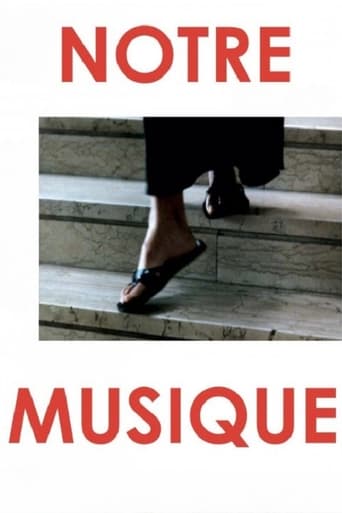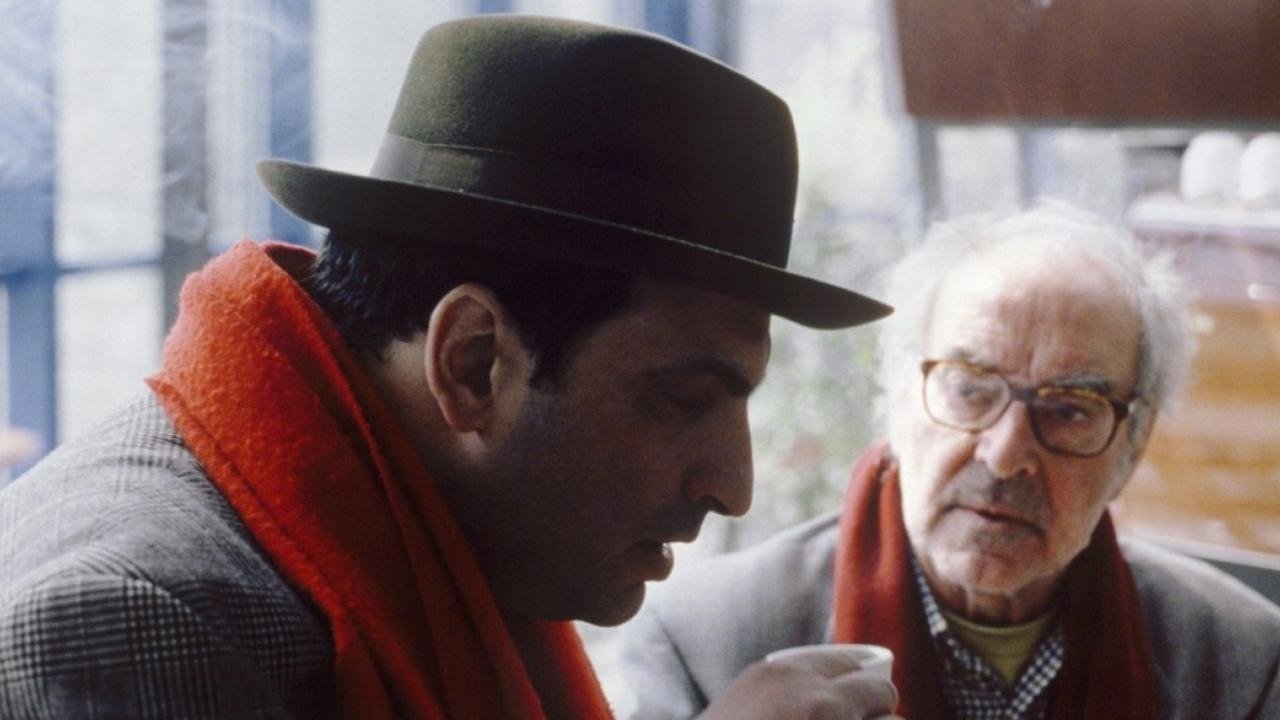Joseph Sylvers
Was really the best film of 2004 and I am a bit shocked that I heard as little as I did about it. Like The Divine Comedy, the film is broken into three parts, Inferno, Purgatory, and Paradise except the realms of the afterlife are here used as political metaphors. The Inferno is ten minutes of images of war from all of film history and some stock footage, Purgatory is the "story" part of the film about a meeting of artists, thinkers, and journalists in bombed out Sarajevo for a conference, and Paradise is a beautiful impressionistic beach resort guarded by US Marines. The dialogue is fairly oblique and stilited, but thats just how Godard rolls. If you can keep down the little reactionary who lives inside us all anytime we sense that dreaded word "pretentiou..", than you may find yourself moved by the end, moved in a way Godard has not moved anything in quite awhile.
gmwhite
Godard's status as a filmmaker, and an auteur, cannot be challenged. He no longer needs to make a name for himself and is free (within reason) to pursue the projects he likes, and carry them out to his own satisfaction. He also has an enormous and varied body of work 'under his belt', along with the experience that this has brought. And yet, these facts do not seem to have made him complacent. No one could accuse him of 'going commercial', and though the new Godard is 'nicer' than the strident, know-it-all politician of his Maoist period, he can't be accused of slowing down.This film is a case in point. Within in, one finds so much going on, so many ideas, and at such a pace, that it really needs multiple viewings. At 75 minutes, it flies by. It is hard, therefore, to cover all the issues raised by the film, but I will try to give a summary of my impressions.The film follows a basic triptych structure named according to the rather Catholic names of Hell, Purgatory and Heaven. Parts 1 and 3 act like short wings to the hour-long centrepiece.In a brutal first 10 minutes, appropriately called 'Hell', one is confronted with a mix of images of war from film and from war footage. Personally, I've always found documentary footage of war, however grainy or poorly shot, much more troubling than the most violent parts of acted film (such as Saving Private Ryan). Is Godard pushing the two together (implying moral responsibility of the filmmaker), or contrasting them through montage? (Suggesting the dual aspects of film-making, which he will emphasise later in the film, when comparing Israelis, who have become a film, to the Palestinians, who have become a documentary.) Like the rest of the film, it is a brilliantly edited tour-de-force of images and ideas.The second section, Purgatory, consists largely of discussions between writers and journalists drawn to Sarajevo for a literary conference. The number of questions (though not answers) that bubble to the surface in these discussions is astounding. Citations (a Godardian standard) are given new meaning through editing / montage. And many more eminently quotable lines are added by Godard and the other participants, literary figures playing themselves, such as Mahmoud Darwish, whose analysis is original and perceptive, and Juan Goytisolo. This section has a documentary feel, but an artist's aesthetic. The film itself looks superb, demonstrating a real eye for shot composition. This makes his films 'surface' extremely watchable, even before the 'substance' is broached. The substance is tasty too, with a superabundance of wit on parade, not in the sense of trite humour, but real insight, combined with a sober sigh before the unchangeable.The last 'movement' is of course 'Heaven', which is amusingly guarded by US marines, and looks a little like the less-than-heavenly site in which the end of Godard's 'Weekend' was played out. This playfulness and self-referentiality was typical of the rest of the film also, for example, in the trio of vocal Native Americans reminiscent of characters in 'Sympathy for the Devil'. Where does quotation end and creation begin? Godard's work is full of citation and self-allusion, but due to the (specifically filmic) nature of montage and narrative context, these citations and allusions take on new meanings.The film is, therefore, certainly elitist, as are so many great films (and novels for that matter). 'Notre Musique' demands a cine-literate viewer, and preferably also familiar with Godard, since there is a lot of meaningful and playful self-referentiality. (One could also argue that someone new to this kind of film-making might be challenged to improve their cine-literacy). More importantly, it demands an alert viewer, because there is potentially much more happening than merely what is on the screen. Godard, in examining filmic space has also created a space between screen and viewer, making him or her an active part of the process of meaning-making.Certainly, if all films were of this caliber, one would get a sore head thinking them through, but it is important to be enlivened by such a work as this from time to time, just to remember film's artistic and intellectual potential.
el_panecillo
This film may be, at first at least, a little bemusing. Goddard does whirl you around with unanswerable questions with few solutions, but isn't the fact that hes at least asking enough?Goddards film reviews society as it is today : transitional and incoherent to the everyday citizen. War, Racism, Anger and Hate fill our land, and Goddards questioning of all these social factors creates an intriguing film. There is no narrative, Goddard simply works with film, digital imagery, voice-overs and art (yes, art...) to convey his viewpoint."Cinema is the light that shines on to our night"...
steviekeys
A huge portion of the world's population consider Americans lazy, uninformed (because they are lazy), short-sighted (because they are uninformed), narcissistic (because they are short-sighted)."Can 30 million Frenchmen be wrong?" "Probably," we would say (that the French are worthy of scorn being an article of faith among a huge portion of our population)."Well, what about 3 billion non-Frenchmen?"Anyone who makes a filmlike this....uncompromisingly serious (this is a huge slap in the face to the notion that movies are about entertainment) political (read "leftist"), fiercely anti-American will be dismissed as difficult, obtuse, elitist. This is an anti-War movie and not one of those treacly "King of Hearts" anti-war movie that lets the audience off the hook by allowing them to congratulate themselves for their sympathy for the director's view. That is much too easy for someone like Godard who likes to think that mankind's endless history of "cutting off each other's heads" is unspeakably horrible, somehow something to be taken seriously.Maybe it's OK for someone to ask the audience to do a little work when engaging a work of art.This is a sublime experience. The look of the film is endlessly breathtaking....how does he get that look???? (i've never seen anyone else who could do this. And the musique, the cutting in and out of these short searing bursts of symphonic music....This pass weekend i saw 2 movies on DVD - Notre Musique and Predator. Yes, i relished the chance to see an Arnold classic and yes, i felt reluctant to have to put up with Godard's cranky obtuseness. After watching Schwartzeneger (??) I felt like i'd just wasted 2 hours of my life that i would never get back. After watching JLG, I felt like my view of the world had been permanently changed.The message of this film is that it might soon be too late. For anyone not interested in buying into such things, there is always Predator 2.


 AD
AD


